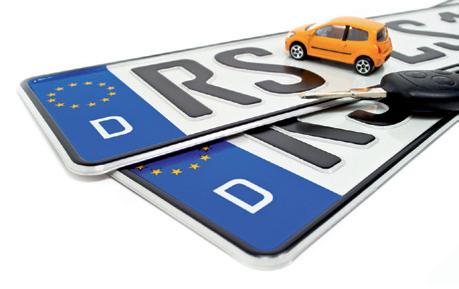
5 minute read
Going green through recycling ecolabels
USAG Stuttgart Environmental Office
Figuring out how to sort trash and recycle environmentally friendly products in Germany can be quite complicated with different color bins and eco-labels.
Germany has a very thorough waste sorting system with up to five or six different categories of waste and practices that vary from county to county—and occasionally from city to city—so things can quickly get confusing.
To help residents sort out all of the mess, U.S. Army Garrison Stuttgart offers an in-depth guide to recycling that outlines specific procedures for all of the four major counties in the Stuttgart area and also on-post. This guide, along with the general overview provided here, should arm most residents to recycle properly and help do their part to contribute to our host nation’s impressive recycling efforts.

Make sure to sort your trash and recyclables in Germany, it's the law!
One of the most common frustrations for Americans is having a much smaller trash bin. However, this is often a frustration that does not have to be endured. Trash cans are supposed to be based on family size and are usually adequate as long as recyclables and other trash are being properly sorted.
Larger families who find themselves constantly over-filling their trash bins should consider talking to their landlords about getting larger cans, although this may affect the monthly trash fee and a landlord will likely pass that cost on to the renter depending on the specifics of the rental arrangement.
Residents may inquire for more information about a larger trash can at local city offices, but in most cases it will ultimately have to be the homeowner or landlord who orders the larger bin.

For on-post residents, things are relatively simple. Clearly-labeled containers are available in all housing areas, and the online guide details which items can and cannot go into each container.
Residents living off post should note that bringing trash on post to dump is prohibited unless you are taking items such as paint, cleaners, and lubricants to the Re-Use Center on Panzer Kaserne.
For off-post residents, getting rid of extra trash is not costly. In fact, it’s sometimes free, but does take some effort and coordination. Some areas have recycling centers and city dumps where residents can take their trash, and almost all areas have procedures for residents to request pick-up of bulk trash and other non-standard waste. These pickups can be free of charge but are usually only offered a limited number of times per year. Contact the agency in your area for more information.
Although specific procedures vary, most programs divide trash and recyclables into six categories: trash/rubbish, recyclables, paper, organic waste, glass and hazardous waste.
There are differences in how trash and recyclables are handled in the four major Stuttgart-area counties—the main difference being the various bins and how items are sorted. Glass is handled much the same at various recycling points, while hazardous materials and bulk trash have their own, specific requirements.

In Böblingen County, home to Panzer Kaserne, there are four bins, all black, but with color-coded lids. A black lid is for trash, an orange lid is for recyclables, a green lid is for organic and a blue lid is for paper.
The city of Stuttgart uses three bins and the yellow sack. A grey bin is for trash, a green bin is for paper, a brown bin is for organic waste and yellow bags are used for recyclables. Yellow bags can be picked up at city halls.
Ludwigsburg County uses five bins, a black bin with yellow lid for recyclables (packaging not made of paper and glass), a black bin with blue lid for glass, a green bin for paper, a brown bin for organic and a grey bin for trash. Sperrmüll, or bulky trash, is residual waste that is too big for the regular trash bin, but does not exceed a given size. For example, in Böblingen, it cannot exceed 2 meters by 1.2 meters by .8 meters, and must weigh less than 60 kilograms per piece.

Mattresses, cupboards, bed frames, furniture, carpets, mirrors, suitcases, skis and surfboards are all examples of common bulk trash items.
For a more detailed description, see the online Handbook for Waste Disposal for either Off-Post or On-Post residents.
Ecolabels
Ecolabels are official symbols placed on products designed to do less harm to the environment than similar products. The next time you’re shopping for food, appliances, clothing, paint, etc., look for the one with ecolabel, Blue Angel (Blauer Engel) or Energy Star logos.
The European Ecolabel helps to identify products and services that have a reduced environmental impact through their product life cycles. It is celebrating more than 25 years of helping Europe be greener and more humane—in addition to not being harmful for the Earth, clothing and textiles must be assembled in safe and fair conditions.
The German “Blue Angel” (Blauer Engel) ecolabel is awarded to products and services which, from a holistic point of view, are of benefit to the environment and meet high standards of serviceability, health and occupational protection.
View the garrison recycling handbooks in the “Housing” section of the USAG Stuttgart mobile app and at https://www.stuttgartcitizen.com/featuredstories/usag-stuttgart-onoff-post-recycling-guides/








